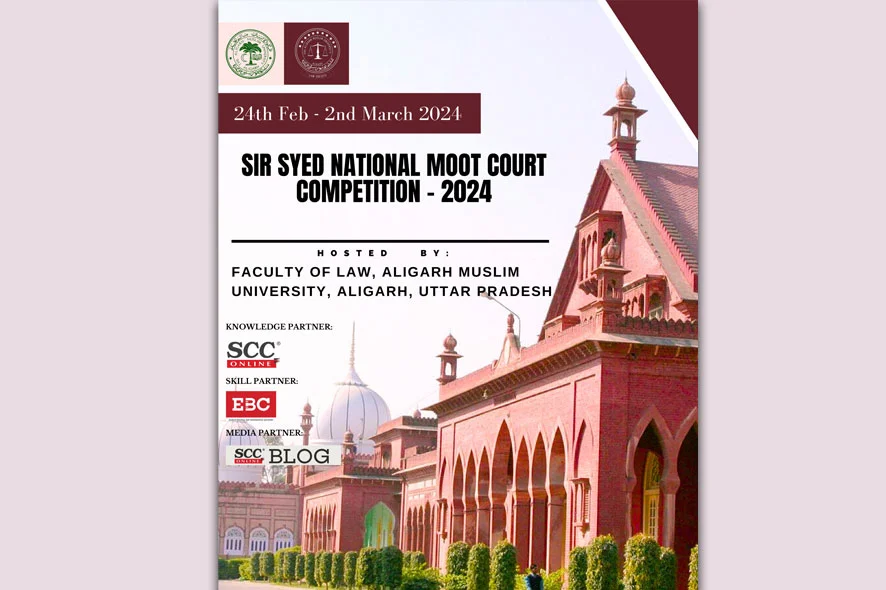ABOUT THE ALIGARH MUSLIM UNIVERSITY
Aligarh Muslim University (A.M.U.) is among the oldest Central Universities of India. It was established by Sir Syed Ahmad Khan, the great social reformer and statesman. In 1875, he founded the Mohammedan Anglo Oriental (M.A.O.) College in Aligarh and patterned the college after Oxford and Cambridge universities that he had visited on a trip to England. His objective was to build a
college in tune with the British education system but without compromising its Islamic values. It was one of the first purely residential educational institutions set up either by the government or the public in India. It was also around this time that a movement began to have it developed into a university. To achieve this goal, expansions were made and more academic programs added to the curriculum of the college. By 1920 the Mohammedan Anglo Oriental College was transformed into the Aligarh Muslim University through a legislative enactment.
DAY 01: INAUGURAL
[24 February 2024]
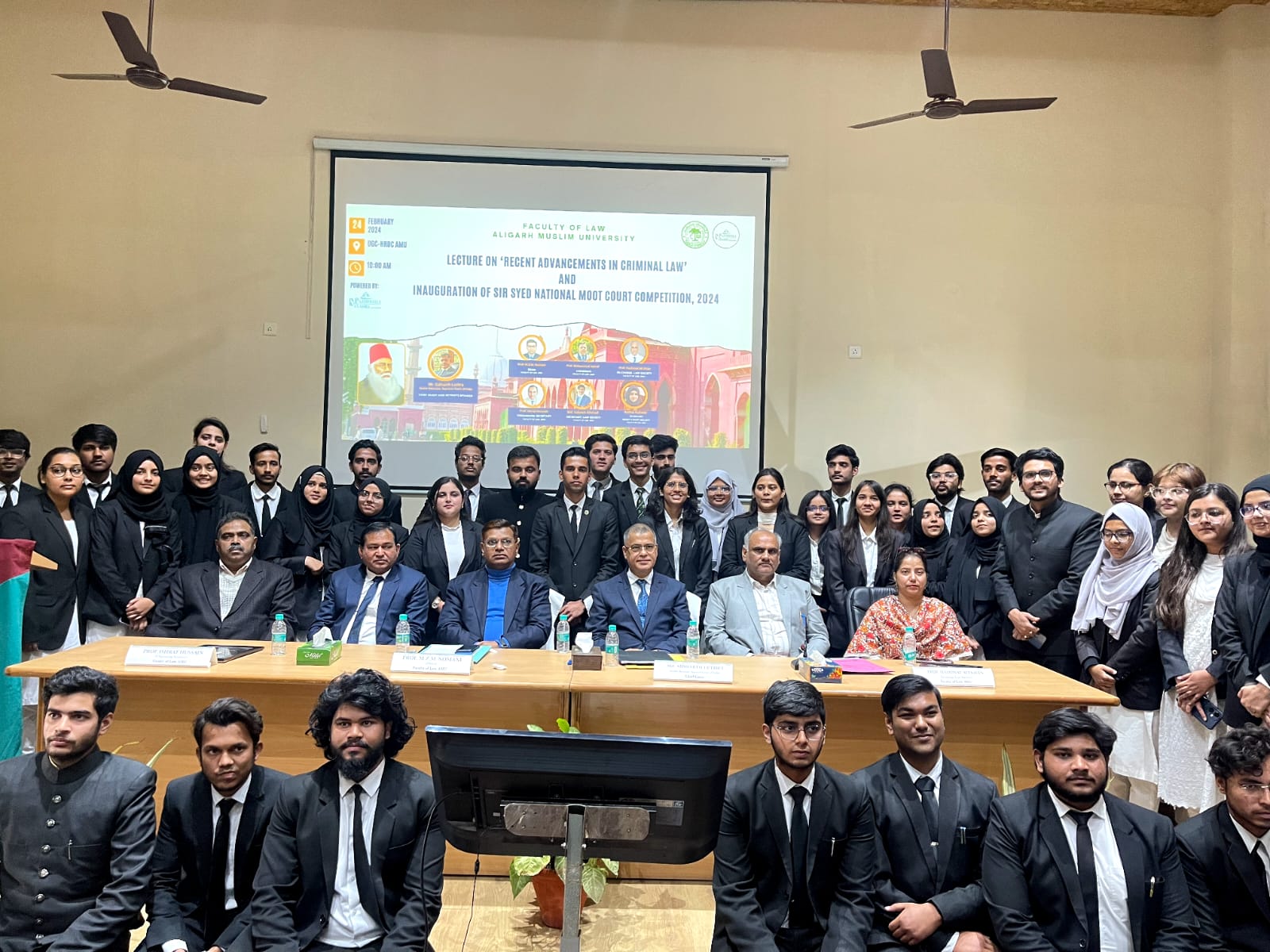
The inaugural programme for the Sir Syed National moot Court Competition (SSNMCC) 2024 was held on the 24th of February 2024. The inaugural was done by the Chief Guest for the day Senior Advocate Mr. Sidharth Luthra, former Additional Solicitor General for India, who also delivered a lecture on ‘Recent Advances in Criminal Law’. Mr. Luthra also explicated the passage of reforms in substantive and procedural criminal law.
Prof. M.Z.M. Nomani, Dean, Faculty of Law while welcoming the guest speaker noted that Mr. Luthra has brought paradigmatic changes in Indian criminal justice system in post Nirbhaya Judgment through his impeccable advocacy.
Earlier, when introducing the Chief Guest, Prof Ishrat Hussain, Organizing Secretary, Moot Court Society introduced Mr. Luthra by describing his career in law teaching and legal practice.
In his concluding remarks, Prof Hashmat Ali Khan stated that Mr. Luthra’s lecture dispelled the misgivings about recent criminal law reforms.
Mr. Sabeeh Ahmad, Secretary, Law Society and Ms. Asma Nafees, Secretary Moot Court Society announced the results of memorials for semi final and final rounds.
Finally, Dr Syed Mohd Yawar, Assistant Professor extended a vote of thanks.
DAY 02: ORIENTATION SESSION & DRAW OF LOTS
[01 March 2024]
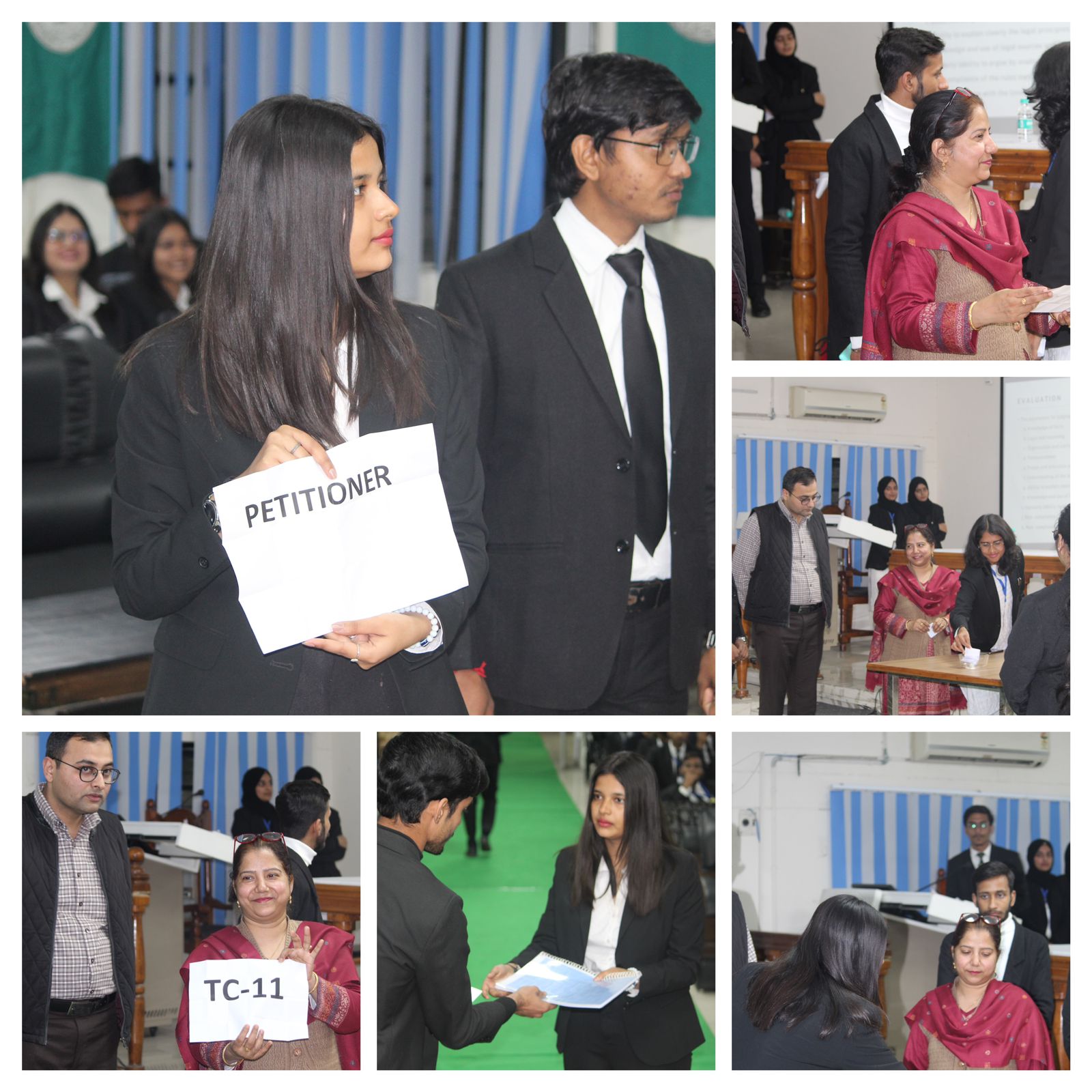
An orientation session for the semi-finalist teams of the Sir Syed National Moot Court Competition (SNMCC) 2024 was held on 01st March 2024 at 05:00 P.M. at the Moot Court Hall at the Faculty of Law, Aligarh Muslim University.
The session commenced with a heartily welcome of the teams by Ms. Rafia Chaman and Ms. Fatima Zainab. They gave a brief introduction about the rich legacy of the university, also referring to its list of respectable alumni in the legal profession. Thereafter, Ms. Asma Nafees, secretary of the Moot Court society took to the stage to explain the rules for the semi-final and final rounds to all the participating teams.
Mr. Sabeeh Ahmed, Secretary of the Law Society, invited the faculty members to draw the lots in order to determine the match-ups for the semi-final rounds scheduled to be held the next day. The matchups determined were as follows-
TC-11 (Petitioner) v. TC-19 (Respondent)
TC-21 (Petitioner) v. TC-09 (Respondent)
Following this, the petitioners and respondents exchanged their memorials.
Thereafter, Dr. Syed Mohd Yawar, Additional In-charge, SSNMCC 2024, welcomed the teams and wished them luck for the semi-final. Dr. Yawar noted the value of SSNMCC 2024 owing to it being held after a gap of 4 years due to the COVID-19 pandemic.
Finally, Dr. Zeba Azmat, Assistant Professor, congratulated the semi-finalists and wished them luck and success for the competition scheduled for the following day. The Orientation programme concluded with high tea.
DAY 03: SEMI-FINALS, FINAL, AND VALEDICTORY
[02 March 2024]
09:35 AM: Judges have arrived at the Faculty of Law, Aligarh Muslim University
SEMI-FINAL ROUNDS
Court – 1
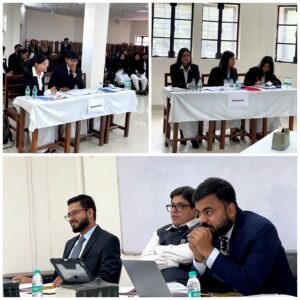
9:52 AM: The teams arrived and sat down in the courtroom.
9:56 AM: The reputable judges, Mr. Shariq Abbasi, Mr. Aman Alam and Mr. Zain Haider arrived and sat in their respective seats in the courtroom.
9:57 AM: The session of the courtroom began and the petitioner presented the problem in front of the respected judges. The judges questioned on what basis the petition was filed which the speaker answered. They further questioned the counsel regarding the two petitions filed in the same case.
10:04 AM: The Speaker-1 of TC-11 mentioned that the problem revolves around Article 22 (5) which the judges asked her to read out from the bare act. The petitioner further mentioned that the detention violated the fundamental rights of the person.
10:10 AM: The judges asked to mention the petitioner, the case law she is relying on, which the counsel answered to be Pritam Singh v. State of Punjab. Thereafter, counsel was reminded of the first time marking for pleading their case.
10:14 AM: The judges asked the counsel to summarise the main issues pertaining for which the petition is filed. They further cross questioned the counsel regarding a recent case law.
10:17 AM: Speaker-2 from the TC-11 came forward and pleaded her case in front of the judges. The judges remarked that they cannot override the rule laid down by a nine-judges bench regarding the COFEPOSA Act and question the constitutionality of the law laid down.
10:23 AM: The judges questioned the counsel regarding the amount and weigh of the smuggled gold and how it puts a question on public security.
10: 25 AM: The time assigned to the counsel from the side of petitioner ended, however the judges further questioned the counsel regarding a contradictory statement made by the counsel. The judges went on to discuss the case among themselves.
10:29 AM: The judges mentioned the issue with the approach of the counsel by which she plead her case, they further asked on what grounds do one test the constitutionality of the statute. Then, the counsel was asked to conclude her argument.
10:34 AM: The judges remarked that the counsel could have done her research much better. The judges went on to explain the basis on which a SLP(Special Leave Petition) is filed.
10:40 AM: The counsels for the Respondent (TC-19) began their argument.
10:48 AM: The judges reminded the Speaker-1 that in case of two cases being petitioned in one, the team needs to mention it on the front page. The time assigned to the speaker ended, however, the judges further questioned regarding why the detention order was passed.
10:54 AM: The judges questioned the purpose of passing the detention order while the bail request is still pending and found fault in the overzealous officials of the State and reminded that they need to be responsible to the public as they are the Union. Therafter, the judges asked the speaker-1 to conclude her case and to only put the question around COFE POSA Act and not on their jurisdiction.
11:00 AM: Speaker-2 from TC-19 began to plead her case and as to why she wants the detention to be upheld. The counsel referred to the case of M. Ahamedkutty v. Union of India & Gov. of India v. Smt. Alka Subhash Gadia.
11:08 AM: The speaker-2 referred to the case of Pramod Singla v. Union of India, which the judges questioned upon, as the detention order was quashed in that particular case.The counsel further said that COFE POSA Act is not ultra vires to the constitution of Indiana and that it keeps in mind the National Security and Economy.
11:15 AM: The judges asked the counsel to mention a recent judgement relating to the issue as the case law she was referring to was based on FERA, which is now repealed, where the later mentioned the case of Draupadi Devi v. Union of India. Later, the judges asked speaker-2 from TC-19 to conclude her argument.
11:18 AM: Speaker-1 from TC-11 questioned regarding the procedure not followed by the petitioner for the detention order to be passed. To which TC-19 did the sur-rebuttal.
11:26 AM: After some concluding remarks, the Court has risen.
Court – 2
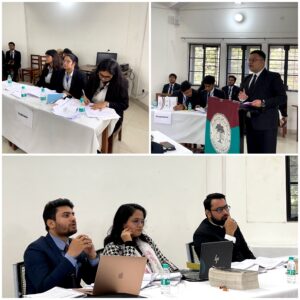
09:52 AM: Both teams in Court Room 2 have arrived for the Semi-Final Rounds and have informed the Court Marshal regarding the time bifurcation.
09:57 AM: Asked for the team codes of the respective teams.
10:02 AM: The Semi-Final Rounds have begun with the arrival of the Judges and the teams are very enthusiastic for the same.
10:03 AM: With the due permission of the Judges, the rounds have begun with Speaker 1 of TC- 21 (Petitioner) approaching the dais to present their arguments before the Hon’ble Bench.
10:03 AM: Speaker 1 has begun is addressing issue 1 for 8 mins and is establishing the same. The Judges are following her arguments through the Memorials and documents provided.
10:04 AM: Hon’ble Judge Sanchita Ain: when did the detention begin?” Hon’ble Judge Mr. Mohd Kumail Haider: “What was remedy that was already exhausted? Are we aware of the provisions that went under? If the rejection was made then how was it made under the Article 136?”
10:11 AM: After counsel’s time was exhausted, a one-minute extension was granted by the Bench.
10:12: Hon’ble judge Mr. Kumail asked for clarification on the concept of parity and highlighted its importance by saying “everyone should be aware of this.”
10:15 AM: Speaker 2 of TC-21 has greeted the Hon’ble Judges and begun the arguments on issue 2.
10:17 AM: Hon’ble judge Mr. Salman Qasmi questioned the validity of preventive detention and whether petitioner has mentioned any case referring to the same.
10:19 AM: Petitioner contended that Article 22(5) of the Constitution has been violated and Hon’ble judge Mr. Salman Qasmi asked the question of parity.
10:21 AM: Petitioner cited the landmark case of Pramod Kumar v. Union of India.
10:22 AM: Bench questioned the relevant ground for quashing detention order.
10:23 AM: Counsel responded that there had been a breach of procedural safeguards.
10:25 AM: Bench sought an explanation as to how the delay in detention affected the right to represent of the petitioner.
10:27 AM: The Bench questioned “is preventive detention a legacy of colonial rule?”
10:28 AM: Replying affirmatively, counsel nevertheless restated its constitutionality and necessity in certain cases.
10:30 AM: The Bench asked whether a certain procedure is to be followed after quashing of detention order?
10:34 AM: Counsel seeks permission to extend the time for 2 mins and the judge asked to refer to the para 5 and remarked language of speaker 2 to be fishy and arbitrary.
10:35 AM: Prayer started by the petitioner and the judge asked to come to prayer 2.
10:39 AM: Respondent (TC-09) started their arguments. Speaker 1 of TC-09 requested permission to approach the dais.
10:40 AM: Question was asked by Hon’ble judge Ms. Sanchita Ain: “What is the difference between Special leave petition and Appeal?”
10:46 AM: Hon’ble judge Mr. Salman Qasmi asked the counsels whether their submission is that the Bench is incompetent to make the decision.
10:51 AM: At the end of her allotted time, the Speaker 01 asked for extension of time.
10:54 AM: Hon’ble judge Sanchita Ain asked the Speaker 01 of TC-09 to make the best point that he could make.
10:57 AM: Speaker 02 sought permission to approach the dais. He dealt with issues 2 and 3.
11:01 AM: Reference to Kesavananda Bharti v. State of Kerala case was done by Speaker 02 of TC-09. He stated that “Welfare state stated in part 4 is of great importance. There has to be a compromise between liberties of the individual and the welfare state.”
11:03 AM: Question asked by Hon’ble Judge Sanchita Ain to Speaker 02 of TC-09 was that “How do you fulfil the test of Subjective Satisfaction?”
11:06 AM: Hon’ble Judge Mr. Mohd. Kumail Haider questioned that “Are you agreeing to the fact that there was delay? Yes or no?”
11:06 AM: Speaker 02 of TC-09 started with Issue 3.
11:18 AM: Speaker 02 of TC-21 cited the case of the Kedar Nath v. State of Bihar and said that the sedition was held to be of constitutional nature.
11:21 AM: Speaker 02 of TC-09 took to the dais for rebuttals.
11:24 AM: Speaker 02 of TC-09 asked for extension of time. Hon’ble judge Mr. Kumail Haider questioned “Did you rebut the IR judgment case cited by the Petitioner?”
11:25 AM: Speaker 01 of TC-09 asked for sur rebuttals. 30 seconds was granted to them.
11:34 AM: After some concluding remarks, the Court has risen.
THE FINAL ROUND
Venue: Moot Court Hall, Faculty of Law, Aligarh Muslim University
The final rounds, as well as the events following them, shall be hosted by BALLB students Ms. Nashrah Naeem and Ms. Faiza Fatima.
11:45 AM: The judges for the final round have arrived at the Moot Court Hall, Aligarh Muslim University.
11:50 PM: The finalist teams were announced as TC-19 & TC-21. The announcement was done by Prof. Ishrat Hussain, Organising Secretary, SSNMCC 2024.
12:00 PM: Prof. MZM Nomani, Dean, Faculty of Law, Aligarh Muslim University introduced the judges to the audience as time was granted to the finalist teams to prepare after the memorial exchange.
12:26 PM: The finalist teams arrived at the Moot Court Hall.
12:28 PM: The Hon’ble judges for the final rounds graced the Bench. The Bench comprises of: Hon’ble Mr. Justice AN Mittal (Former Judge, Allahabad High Court), Hon’ble Mr. Justice Ifaqat Ali Khan (Former Judge, Allahabad High Court), Mr. Riyasat Hussain (Former District Judge), Mr. Syed Farman Ahmad Naqvi (Senior Advocate, Allahabad High Court), Mr. MR Shamshad (Advocate on Record, Supreme Court of India).
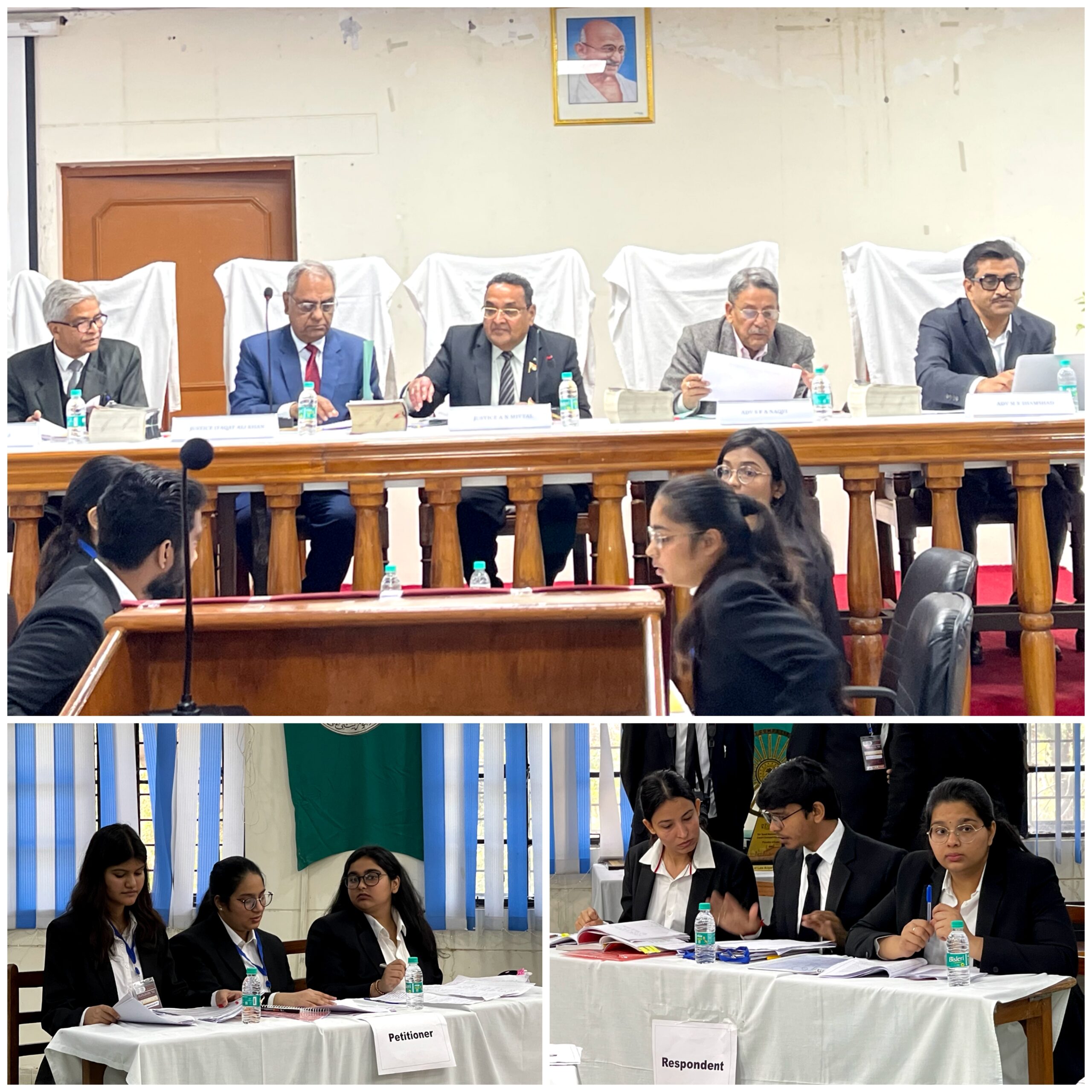
12:35 PM: TC-21, the petitioner team was assigned 30 mins of time to speaker-1 and 8 mins to speaker-2. Speaker-1 started pleading her case regarding the Section-3 of COFEPOSA Act and its constitutionality while referring the case of Jamshed Wadia v. Board of Trustees, Draupadi Devi v. Union of India.
12:43 PM: The bailiff displayed the sign of “5 minutes remaining”.
12:45 PM: The petitioner began dealing with the second issue 2.
12:46 PM: A question was posed by Hon’ble Mr. Justice Mittal: “Why should you be permitted to import gold unauthorisedly You were arrested on the spot with 9 kg of gold.”
12:47 PM: Petitioner responded: “We have been detained merely on the basis of the likelihood that there was smuggling. We were even granted bail.”
12:48 PM: Hon’ble judge MR Shamshad questioned the extent to which the petitioners can push this matter since the law on this matter has been decided by a two-judge Bench, and a reference to a Constitutional bench is still open.
12:51 PM: The second speaker sought permission and was granted to approach the dais. She sought 17 minutes to deal with issues 2 & 3. With regard to the second issue, counsel stated three reasons for answering the first issue in the affirmative.
12:53 PM: Counsel for petitioner: “Article 22 explicitly talks about the importance of the communication being done as soon as possible. However, we were denied the documents we sought.” Counsel also referred to Motilal case.
12:54 PM: Counsel referred to Pramod Singla v. Union of India to argue that detention order can be quashed wherever there is a delay.
12:57 PM: Counsel moved to issue 3 and argued how COFEPOSA and preventive detention law in general carries a colonial legacy. Further, it was argued that since section 3 of the COFEPOSA act lies completely on the subjective satisfaction of the executive, the said provision is vague and therefore, unconstitutional.
12:58 PM: Hon’ble Justice AN Mittal questioned the reasons for the petitioner’s discontent with the High Court order, to which the counsel argued that the High Court has not followed the due procedure and failed to refer to the relevant law on the subject.
01:00 PM: Hon’ble judge MR Shamshad questioned if it is the petitioner’s case that non-compliance of procedure directly hits Article 19.
01:07 PM: The counsel concluded by stating that colonial legacies such as that of the sedition law and the preventive detention law must be reviewed in time by the Supreme Court. The petitioner rested their case by reinstating their prayers.
01:09 PM: The first counsel for the team TC-19 began making her submissions. 13 minutes were sought to be reserved for the first speaker; 17 minutes for the second speaker and 5 minutes for sur-rebuttal.
01:12 PM: Hon’ble Justice A.N. Mittal questions as to why the documents were not provided when the provision mandates the State to provide them within 15 days at most.
01:14 PM: The Bench asked counsel to feel comfortable and not be nervous. Counsel requested the question to be repeated.
01:18 PM: The counsel moved to the second ground while stating that Section-3 of COFEPOSA is not ultra vires to the Constitution. Moreover, it was stated that there is no question of law since the Supreme Court has had multiple occasions to clarify the law on section 3 of COFEPOSA.
01:21 PM: The counsel mentions 4 grounds when the higher court may interfere in such a matter, and sought to explain how the case of the petitioner herein fails to pass muster.
01:22 PM: An additional minute’s extension was sought and granted. The first speaker thereafter concluded her arguments.
01:30 PM: Hon’ble Justice Mittal remarked that the respondent has been referring to too many judgments, and if she could explain the ratio decidendi of the last 5 cited cases.
01:35 PM: Hon’ble judge Mr. MR Shamshad exclaimed that procedural compliance is a significant right of the detainee.
13:35 PM: The counsel argued that Section 3 of the Act is necessary for national safeguard; it does not violate Article 19 and is required to protect national Security and economy. Reference was made to judgments to bring about the point that illegal activities pertaining to foreign exchange falls within the ambit of hampering national economy, and was a fit field for a preventive detention order.
01:38 PM: Counsel argued that the impugned section does not violate Article 14 as it does not create any arbitrary and unreasonable classification among the people detained. It also does not violate Article 21 as it does not deprive people of their personal liberty.
01:40 PM: An additional minute’s extension was sought and granted to the counsel.
01:42 PM: Counsel concluded by restating that the impugned provisions are not ultra vires the Constitution. Counsel concluded her submissions by restating the prayers.
01:43 PM: Counsel for the petitioner was informed that she has 5 minutes for rebuttal.
01:44 PM: Counsel for the petitioner submitted that a jeweler merely getting 12 pieces of gold cannot be said to pose a threat to national security. Further, the detainee had cooperated with the investigating agency by submitting his passport and therefore, has no intention of absconding.
01:46 PM: Counsel submitted her three points: the likelihood of smuggling was less than 50%, the detainee did not pose a flight risk, and that the preventive detention laws were unconstitutional. With this, the counsel for the petitioner concluded her rebuttal.
01:47 PM: Hon’ble Justice Mittal thanked the teams for their participation and announced that the judgment has been reserved.
01:48 PM: Ms. Asma Nafees (Secretary, Moot Court Society) addressed the audience and thanked the judges of the semi-final and the final rounds for their time. She also thanked all the faculty members that were involved in the moot court competition.
01:50 PM: As the Hon’ble Judges allotted marks to the finalist teams, Mr. Amne Alam, Advocate took to the dais to provide some feedback to the participating teams. Following this, Mr. Salman Qasmi, Advocate also noted the efforts that went behind the organisation of the moot court competition. Thereafter, Mr. Zain Haider was invited to the dais to address the audience.
02:05 PM: Ms. Sanchita Ain, Advocate-on-Record at the Supreme Court of India took to the stage to express her delight at progressing the Faculty’s development; she noted how there has been an increase in the number of women law students and lawyers.
02:07 PM: Mr. Kumail Haider, Advocate addressed all students to emphasise on the importance of moot court competitions and mock trials.
02:12 PM: Hon’ble Mr. Riyasat Hussain, Former District Judge addressed the audience to say that in every case, the ratio must be studied by a student.
02:13 PM: Hon’ble Mr. Justice AN Mittal, Former Judge, Allahabad High Court remarked light-heartedly that we are living in the age of “Google uncle” and that a law student must not research in that manner. He pressed upon the point that the knowledge gained by reading books is unmatched. Justice Mittal ended his brief address by repeating the words of the University anthem (tarana) – “ye mera chaman, hai mera chaman, main apne chaman ka bulbul hun”.
02:18 PM: Hon’ble Mr. Justice Ifaqat Ali Khan, Former Judge, Allahabad High Court addressed the audience to remark that after a 35-year career of attending real-courts, this was perhaps the best court he has ever presided. This was followed by a thunderous applaud. Justice Khan emphasised that the behaviour and demeanour of a lawyer is also very important to the outcome of his case. Further, he said that advocacy is a full-time job. He restated the adage that the law is a jealous mistress.
02:23 PM: Thereafter, Mr. MR Shamshad, Advocate-on-Record at the Supreme Court of India took to the stage. He referred to the AK Gopalan case to mention how Justice Fazl Ali’s dissent eventually assumed significance and how Menaka Gandhi and Puttuswamy changed the law to have a pro-liberty stance. Mr. Shamshad also brought everyone’s attention to the importance of facts in any case.
02:30 PM: Thereafter, Mr. SFA Naqvi, Senior Advocate at the Allahabad High Court addressed the audience to express commendation of all the participants. He expressed that in his student days, he had wished to be a part of the Aligarh Muslim University. Even though this wish could not be fulfilled back then, it has now come true in the form of an invitation to judge this moot court competition.
02:37 PM: Prof. Hashmat Ali Khan, In-charge of the Law Society was invited to deliver the Presidential address. He elaborated on the academic aspects of the moot court problem. He explained the relation between Part III of the Indian Constitution and the laws on preventive detention.
VALEDICTORY CEREMONY
Memento distribution
02:42 PM: Mr. Sabeeh Ahmed presented a memento to Mr. MR Shamshad. Ms. Asma Nafees presented a memento to Mr. Riyasat Hussain. Prof. Hashmat Ali Khan presented a memento to Mr. SFA Naqvi. Prof. Ishrat Hussain presented a memento to Justice Ifaqat Ali Khan. Prof. Nomani presented a memento the Justice AN Mittal.
02:45 PM: Mr. Riyasat Hussain presented a memento to Mr. Salman Qasmi and Mr. Zain Haider. Justice AN Mittal presented a memento to Mr. Amne Alam and Mr. Kumail Haider. Justice Ifaqat Ali presented a memento to Ms. Sanchita Ain. Justice Ifaqat Ali presented a memento to Mr. Shariq Abbasi.
02:47 PM: Ms. Asma Nafees presented a memento to Prof. Nomani. Ms. Alvina Rais Khan presented a memento to Prof. Mohd. Ashraf. Ms. Asma Nafees presented a memento to Dr. Ishrat Hussain. Mr. Sabeeh Ahmed presented a memento to Prof. Hashmat Ali Khan. Ms. Mahvish Fatima presented a memento to Dr. Syed Yawar.
02:50 PM: Mr. MR Shamshad presented a memento to Mr. Zain Haider. Mr. SFA Naqvi presented a memento to Mr. Amne Alam. Justice AN Mittal presented a memento to Mr. Kumail Haider. Justice Ifaqat Ali presented a memento to Ms. Asma Nafees. Mr. MR Shamshad presented a memento to Mr. Sabeeh Ahmed. Mr. Amne Alam presented a memento to Mr. Taha Bin Tasneem. Mr. Kumail Haider presented a memento to Ms. Alvina Rais Khan. Mr. Zain Haider presented a memento to Mr. Qasim Abbas Kazmi. Ms. Sanchita Ain presented a memento to Mr. Usman Haider. Mr. Kumail Haider presented a memento to Ms. Mahvish Fatima. Ms. Sanchita Ain presented a memento to Mr. Farhan Saquib. Mr. Amne Alam presented a memento to Mr. Akhil Kaushal. Mr. Asma Nafees gave Mr. Pawan Varshney’s memento to Mr. Aditya Bhattacharya in absentia. Mr. Amne Alam presented a memento to Mr. Ismail Khan.
02:55 PM: Mr. Sabeeh Ahmed, Secretary of the Law Society took to stage to describe the Faculty’s legacy of excelling in moot court competitions. He invited Prof. Ishrat Hussain, organising secretary of the SSNMCC 2024 to announce the results of the finals.
02:57 PM: Prof. Ishrat Hussain, Organising Secretary of the SSNMCC 2024 declared the winning team as the team from Dr. Ram Manohar Lohia National Law University with the team from SRM University, Sonepat as the runner-up. The best memorial prize was awarded to the team from Dr. Ram Manohar Lohia National Law University. The best researcher award was given to Mr. Kunal Gupta from BR Ambedkar National Law University, Sonepat. The best speaker was awarded to Ms. Disha Bhalla from Dr. Ram Manohar Lohia National Law University.
03:00 PM: Prof. Ishrat Hussain congratulated all the teams and wished everyone the best of luck.
03:05 PM: The winning teams and individuals collected their prizes, cheques, and certificates from the judges as they posed for photographs.
03:10 PM: Prof. Md. Ashraf, Chairman, Department of Law delivered the vote of thanks. He congratulated the winning teams and individuals, while assuring other participants that their participation in itself had been extremely valuable.
03:13 PM: The winning and the runner-up teams posed for photographs with the judges of the final round.
03:15 PM: The Sir Syed National Moot Court Competition (SSNMCC) 2024 came to a grandiose end with the University anthem (tarana) played followed by the national anthem.



